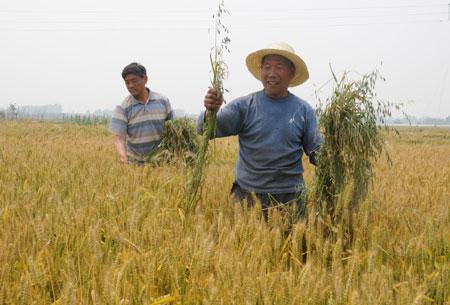
Farmers undertake deweeding operations at a wheat field in Nanyang, Henan province. Xiong Yunbin / for China Daily
Reserves, stable policies to ease crop concerns after recent weather woes
BEIJING - China's summer grain output, which accounts for about a quarter of the annual food yield, will continue its growth trajectory this year despite the recent weather vagaries and ease fears on the inflation front, analysts said on Thursday.
Ample State reserves and stable agricultural policies will continue to keep grain prices steady this year, with limited impact seen from the fluctuations in global wheat prices, said analysts.
Wheat, which accounts for the bulk of the summer grain output, is expected to have yields that are slightly better than last year, Han Changfu, China's agriculture minister said on Tuesday, without providing specific figures.
"Data collected from the provinces and areas are under calculation and the total output is yet to be calculated," Han Jun, director-general of the rural economy department at the Development Research Center under the State Council, told China Daily on Thursday.
Summer grains are the main food source for people in northern China and together with paddy and corn has a 3 percent weightage in the Consumer Price Index, a key gauge of inflation.
Due to the serious drought in southeastern areas and cold weather in northern and eastern China during winter and spring, there were apprehensions that the wheat crop in these areas would be damaged and cause price hikes and inflation.
"Even if China harvests less wheat this year, prices will remain stable due to the huge reserves and protective grain policies," said Hu Bingchuan, a researcher with the rural development institute of the Chinese Academy of Social Sciences.
He said the government owns huge wheat reserves after yields grew for the six consecutive years till 2009.
The overall yield of summer grain was 123 million tons in 2009, up 2.2 percent year on year, according to government statistics.
The speculative trends seen in the grain and vegetable markets will not last, as most of the commodities are seasonal products, he said. Prices of garlic and green soybeans have already started to decline.
Though the weather vagaries will not affect overall output, they will hurt the wheat quality in some areas, thereby providing a niche market for US wheat, said Jing Zhuocheng, an analyst with Shanghai CIFCO Futures Co.
China imported 131,421 tons of wheat valued at $33.9 million from the United States in April, down 31.4 percent from March, according to the Customs.
A report released by the US Department of Agriculture last month said China may import about 900,000 tons wheat during the 2010 to 2011 period.
Han said China will still remain a net wheat exporter, and international prices will have a limited impact on domestic prices.
"Except for soybeans, international grain prices have a very limited impact on China's grain prices," Han said.





